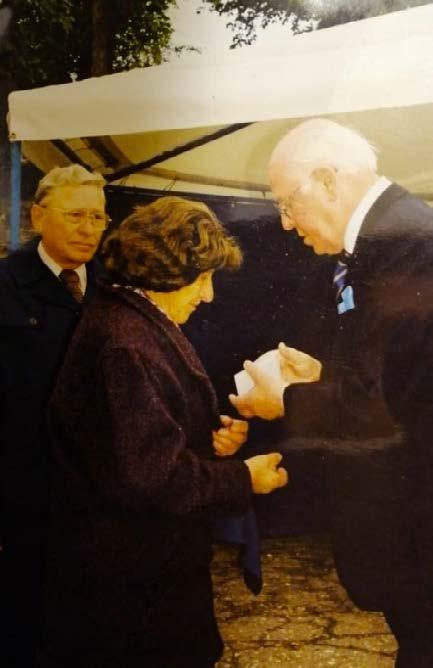
4 minute read
Estonian people deported to Russia
Estonia 1945. The story of a just married woman deported to Siberia.
by Lisett Tiido
This article tells the poignant story of my great grandmother and grandmother, recounting their experiences and the impact of the Soviet Regime in Estonia. The Soviet occupation of Estonia involved the organized mass deportations of individuals considered as active or potential opponents of Soviet power, along with their relatives and family members. These deportations were carried out by the occupation authorities, including the employees of the People’s Commissariat of Internal Affairs of the USSR and the Estonian SSR (NKVD), with the assistance of local collaborators. At gunpoint, people were forcibly evicted from their homes and transported in animal wagons, while their property was seized.
In 1943, my great grandmother Elfriede crossed paths with her future husband, Kalju, while both were residing in Estonia. A year later, they welcomed their daughter, Aime. As the Second World War unfolded, Kalju was conscripted into the German army, leaving Elfriede behind with his family to care for their child. However, in 1945, on August 15th, Elfriede became one of the 407 Baltic Germans deported from Estonia to the Perm Oblast in Russia as part of a deportation operation.
Elfriede was not allowed to retrieve her daughter, and they were all transported in animal wagons to the Perm Oblast

Russian soldiers arrived at Kalju’s family home and took Elfriede, informing her that she would be taken to work on the railway. Instead, she was driven to her parents’ house to gather Elfriede’s mother and her two sisters, who were present at the time. Without warning, they were informed of their deportation to Siberia. Elfriede was not allowed to retrieve her daughter, and they were all transported in animal wagons to the Perm Oblast. The conditions they encountered upon arrival were dire, as numerous families were forced to coexist in large barracks. They were assigned to work in the forest, primarily sawing trees using a two-man saw.
Survival was particularly challenging for families with a sole breadwinner and older men. Many elderly individuals perished during this period, and families were torn apart by the deportations. It was in Siberia that Elfriede met Gustav, whose family had also been left behind in Estonia. They began living together in the village of Giblaja in 1947 and welcomed their daughter, Raili, my grandmother, in 1948.
In 1952, following Joseph Stalin’s death, the deported Estonian individuals were finally granted permission to return to Estonia

Raili’s birth was not without complications, as Elfriede experienced significant bleeding and a doctor had to be summoned from a distance of 40 kilometers by horse. Fortunately, the outcome was a happy one. Subsequently, the family relocated, and their living conditions improved, largely due to Gustav’s work as a driver, which provided them with a better income. They purchased a house and tended to their animals. In this village, they were distanced from other relatives, with only two Estonian families, including my grandmother’s and Aunt Meeta’s families, residing there.

In 1952, following Joseph Stalin’s death, the deported Estonian individuals were finally granted permission to return to Estonia. Elfriede returned in 1956, and they embarked on their new life in Viljandi, Gustav’s hometown. Aime’s father, Kalju, had also started a new family, and they raised their daughter together. Consequently, Elfriede and Kalju divorced in 1961.

In 2001, at the age of 80, Elfriede was honored with the Broken Cornflower badge (Murtud rukkilill) by the Estonian president, Lennart Meri, acknowledging her remarkable resilience and perseverance throughout her life’s journey.
Translation for the broken cornflower badge:
1. The badge to the victim of a foreign is given to a person, who has suffered from communist.
2. The Parliament, the Government of the Republic and municipality have the right to constitute a discount for a victim of a foreign rule.
3. The badge of honour is given by the President of the Republic.










